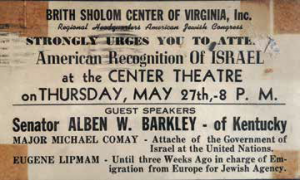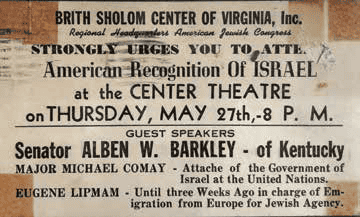 Placing our trust in the “Rock of Israel,” we affix our signatures to this proclamation at this session of the Provisional Council of State, on this soil of the homeland, in the city of Tel-Aviv, on this Sabbath Eve the 5th day of Iyar, 5708. (14th May, 1948)
Placing our trust in the “Rock of Israel,” we affix our signatures to this proclamation at this session of the Provisional Council of State, on this soil of the homeland, in the city of Tel-Aviv, on this Sabbath Eve the 5th day of Iyar, 5708. (14th May, 1948)
Seventy years ago, when the State of Israel was born, it was with no small support from Tidewater’s Jewish community. Some still recall what that day—and the years preceding May 14, 1948—was like.
Joe Segal, for example, remembers saving his own pennies and asking friends to donate to Zionist causes. “As members of AZA, it was a point of pride with us,” he says.
Others heard parents worry that they might be violating federal law by aiding and abetting the organization of a foreign state. Some remember how cautious they felt on November 29, 1947, when the UN declared that the nation of Israel was now a sovereign Jewish State.
But none can forget how members of Tidewater’s Jewish community came together so fervently to support the realization of the biblical promise: a real Jewish homeland. There were banquets, dances, and events with speakers such as Abba Eban, Golda Meier (then Myerson), the Mayor of Dublin, Ireland—and many others, all of whom visited to raise funds to help the new state.
They remember what some of those funds produced: the purchase, outfitting and voyage of the ship known to history as the Exodus. In 1947, a Jewish paramilitary organization known as the Haganah was conducting the Aliyah Bet, a clandestine mission to remove Jewish refugees from Displaced Persons camps established after Word War II , and board them on vessels to (illegally) immigrate to Palestine. The Haganah bought these ships and made them seaworthy.
The largest was the Norfolk-based USS Warfield. Then dilapidated and possibly headed for the scrapheap, the Warfield had been a packet steamer that ferried passengers to and from Baltimore. “It was an overnight trip,” remembers Boodie Friedman. “The ship had staterooms, elegant dining rooms with white-gloved waiters who served the passengers. But by 1947, it had run into disuse.”
The Warfield was designed to carry no more than 500 passengers, but the Haganah intended to refit it with bunks and toilets and load it with enough food and water for 4,500 refugees on its ultimate seven-day voyage from France to Palestine.
Those provisions were solicited and collected through the efforts of many people throughout Tidewater, but everyone who remembers those efforts gives the lion’s share of the credit to David Friedman, Boodie’s father. David had long been active in the Norfolk District of the Zionist Organization of America and held leadership positions in several local Jewish organizations.
Once they learned about the Warfield, David, a grocer by trade, contacted his wholesalers and suppliers—local chains such as Colonial Stores—to seek contributions of non-perishable food. Friedman says, “I don’t remember all of it, but I know there were crates and crates of canned Carnation Milk and Campbell’s Soup, floor to ceiling.”
Once fully loaded, the newly renamed Exodus left for Baltimore to pick up its crew and sailed to Italy to be refurbished. Any jubilation felt by Tidewater and American Jewish communities was short lived, as on July 17, 1947, just six days after the Exodus left France with its first cargo of refugees, the ship was rammed on both sides by two British destroyers, with devastating consequences. The British boarded the ship, ultimately killing at least four and gravely wounding 120 of the crew and passengers. The story is documented in many books—including 1958’s Exodus, by some-time Norfolk resident Leon Uris, which was subsequently made into the 1960 movie of the same name. Joe Segal says that his wife, Millie, did some research for Uris. He proudly displays an autographed copy of Exodus, including a handwritten note of thanks from the author.
The Exodus incident, and the subsequent abhorrent British treatment of the refugees at Haifa, sparked global outrage. The world began to understand the critical need for a Jewish state. The rundown ship that sailed from Norfolk in the early months of 1947 became a lasting symbol of the struggles of a people, the triumph of freedom, and the birth of a homeland.
Friedman remembers how hard his father and so many of his friends and colleagues worked to support Israel’s establishment. “It was his wish that Virginia would be the first of the United States to acknowledge Israel as an independent state,” he says. “He was always so proud that that wish was granted in 1948 by Governor William Tuck, the 55th governor of the Commonwealth, who issued an official recognition of Israel before any of the other 47.”
While some memories remain vivid, others have faded. And some are more or less borrowed: “I was born in March of 1948,” Lorie Friedman relates. “I was the first grandchild on either side of the family, and my mother Doris tells me that the sun rose and set on me – for about two months. When Israel was declared a state two months later, she told me, I became second best. Israel, so hard fought for and so sorely won, became number one. Being second place is a position I’ve been proud to occupy.”
With the same commitment, Tidewater continued to support Israel after 1948. When Prime Minister David Ben-Gurion introduced the idea of issuing bonds in 1950 to raise money for the new nation’s struggling economy, the Tidewater community responded, attending fundraising events hosted by celebrities such as Eddie Cantor and Metropolitan Opera tenor Jan Peerce.
In fact, it was Peerce’s visit to Norfolk that sparked a memory that is still recalled frequently, and always with great affection. Peerce was observing yartzheit and went to Norfolk’s Temple Israel to say kaddish. “It was the custom at Temple Israel to ask visitors if they wanted to daven,” says Ted Kruger. “Peerce agreed, and when he began to sing, his voice just filled the room.” Another member of the congregation obviously unfamiliar with Peerce’s career but genuinely impressed, said, ‘Hey, mister, you have a nice voice. You could be a cantor.’ “We all cracked up at that,” says Barry Einhorn. “And we never let him forget it,” adds Barry’s wife Lois.
Memories aside, this community’s passion for Israel remains fervent, building on the dedication of American Jews that culminated in the founding of the Jewish state, now 70 years ago.
– Bobbie Fisher

